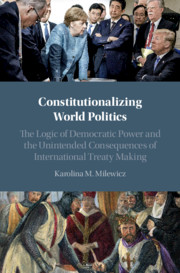 Constitutionalizing World Politics
Constitutionalizing World Politics from Part II - The Logic of Democratic Power in Treaty Making
Published online by Cambridge University Press: 21 July 2020
Chapter 7 returns to the larger topic of constitutionalization in world politics by addressing its contemporary challenges and implications. Despite the strong evidence presented on the relationship of democracy, power, and international rule–based cooperation, recent events raise serious doubts regarding the constitutionalization of world politics. Current real–world developments challenge the continuing relevance of international treaty making, the support for cooperation from the major powers, the stability of democratic principles, and therefore the viability of constitutionalization itself. This chapter lays out those trends and puts them into longer–term perspective, arguing that, although they pose serious threats in world politics, they should not be overstated. The prospects of constitutionalization must be instead approached with realistic skepticism. What today appears as an impediment to constitutionalization may not be so consequential when viewed over the long run. A realistic perspective must therefore take global constitutionalization both skeptically and seriously.
To save this book to your Kindle, first ensure no-reply@cambridge.org is added to your Approved Personal Document E-mail List under your Personal Document Settings on the Manage Your Content and Devices page of your Amazon account. Then enter the ‘name’ part of your Kindle email address below. Find out more about saving to your Kindle.
Note you can select to save to either the @free.kindle.com or @kindle.com variations. ‘@free.kindle.com’ emails are free but can only be saved to your device when it is connected to wi-fi. ‘@kindle.com’ emails can be delivered even when you are not connected to wi-fi, but note that service fees apply.
Find out more about the Kindle Personal Document Service.
To save content items to your account, please confirm that you agree to abide by our usage policies. If this is the first time you use this feature, you will be asked to authorise Cambridge Core to connect with your account. Find out more about saving content to Dropbox.
To save content items to your account, please confirm that you agree to abide by our usage policies. If this is the first time you use this feature, you will be asked to authorise Cambridge Core to connect with your account. Find out more about saving content to Google Drive.